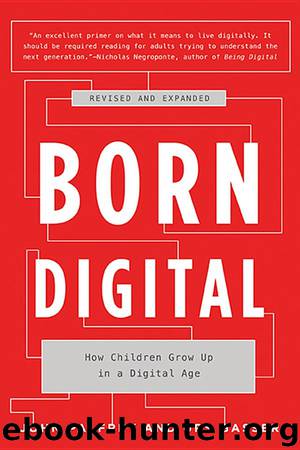Born Digital by John Palfrey & Urs Gasser

Author:John Palfrey & Urs Gasser
Language: eng
Format: epub
ISBN: 9780465094158
Publisher: Basic Books
Published: 2016-06-11T04:00:00+00:00
There’s a raging debate about what to do about information quality on the Internet. Some argue that the answer is greater professionalism online—for example, that the Encyclopaedia Britannica model and other traditional forms of media are superior to Wikipedia and blogs. Others contend that the Internet is self-healing—again citing Wikipedia—and that a combination of technological innovations and social techniques will lead to better information over time. In the strong form of this argument, the Web enables anyone to sort ideas and information better than ever before because people will learn to find the connections and relationships that separate the information wheat from the chaff.52
This debate animates the various approaches to dealing with information quality and how to support young people as they make their way through an increasingly complex, digitally mediated world. There’s a spectrum of approaches, with laissez-faire on one end and an information order approach on the other.
Proponents of the laissez-faire approach believe that information quality should not be regulated in any way. They argue that tussles over the quality of digital content—like the Seigenthaler controversy—are merely transitional, and that these problems will be resolved through the marketplace of ideas over time. The right level of quality will be determined through competition between good and bad content, and therefore, the law has little role to play. In addition, according to this view, commercial players like Google or YouTube should not directly intervene. Rather, as they improve the capacity of their services—for example, by increasing the number of indexed websites, news feeds, and the like—they should leave it to the end user to make any form of quality assessment.
At the other end of the spectrum are people who argue for substantial interventions by the state or other institutional players to improve the quality of information online. The advocates of this approach don’t trust the marketplace of ideas. In fact, they argue that there is an acute and harmful market failure when it comes to information quality (they might cite, for example, the fact that young people have a very hard time making fully informed decisions). This failure, in turn, calls for a set of rules, standards, and principles by which we can ensure the availability of high-quality information on the Web. Those with this view argue that governments should play an active role in regulating information quality on the Internet. If this approach were taken, laws and regulations would be put into place in order to promote a high level of quality, on the one hand, and to fight undesirable content—such as hate speech or pornography—on the other. Under such a regime, the state might impose an obligation on ISPs to block and filter certain kinds of low-quality content, and it might also provide—for instance, through a state-owned media enterprise—a digital information service for its citizens.53
Neither of these extreme approaches makes sense for dealing with the complex information-quality challenges we face in the digital age. Societies have always grappled with such issues—from the first stirrings of the printing press, they have had to determine how to deal with information quality and dissemination.
Download
This site does not store any files on its server. We only index and link to content provided by other sites. Please contact the content providers to delete copyright contents if any and email us, we'll remove relevant links or contents immediately.
Learning SQL by Alan Beaulieu(6290)
Weapons of Math Destruction by Cathy O'Neil(6279)
Digital Minimalism by Cal Newport;(5764)
iGen by Jean M. Twenge(5415)
Sapiens by Yuval Noah Harari(5370)
The Age of Surveillance Capitalism by Shoshana Zuboff(4292)
Elon Musk by Ashlee Vance(4127)
Thing Explainer by Randall Munroe(3939)
Apollo 8 by Jeffrey Kluger(3708)
Future Crimes by Marc Goodman(3600)
The Science Book (Big Ideas Simply Explained) by DK(3286)
The Innovators: How a Group of Hackers, Geniuses, and Geeks Created the Digital Revolution by Walter Isaacson(3208)
Who Can You Trust? by Rachel Botsman(3133)
I Live in the Future & Here's How It Works by Nick Bilton(2997)
Infinite Energy Technologies by Finley Eversole(2984)
Steve Jobs by Walter Isaacson(2899)
Dawn of the New Everything by Jaron Lanier(2770)
Chernobyl by Serhii Plokhy(2538)
Ben Franklin's Almanac by Candace Fleming(2530)
